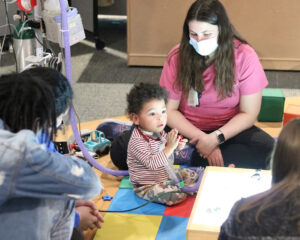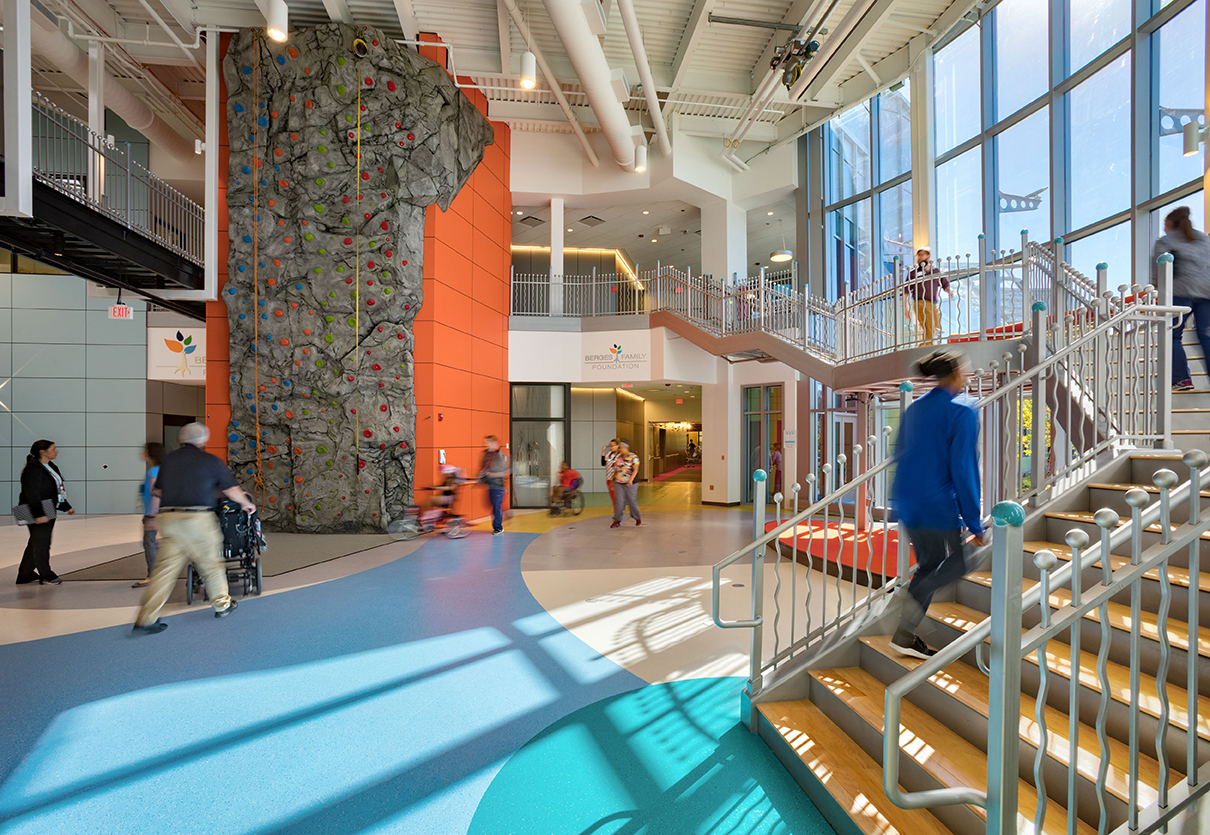In the first study of its kind, researchers say more focus is needed on how and where hospitalized children spend their time
Maryland Heights, Mo. (November 1, 2023) – Hospital environments need to be more stimulating for its youngest patients to mitigate the risk of developmental delay, new research from Ranken Jordan Pediatric Bridge Hospital suggests.
While it is known children hospitalized for prolonged periods are more at risk for neurodevelopmental delay, a new study from Ranken Jordan is the first of its kind to track the movements and interactions of children in a hospital setting, an important first step towards reversing this trend.
The research team used time-motion observations to track 20 patients at Ranken Jordan for more than 230 hours. Key findings include:
- Patients at Ranken Jordan spent nearly half of their waking hours out of bed and about two hours out of their hospital room. They spent five hours of awake time in bed.
For context, Ranken Jordan’s “Care Beyond the Bedside” model, which focuses on healing through play, gets patients out of bed and out of their rooms significantly more than in a typical hospital setting. - The team identified five ways to provide more enriching programming to help with young patients’ neurodevelopment, which include: 1) face-to-face interactions; 2) time out of the hospital room; 3) positional variety; 4) sleep-wake schedules; and 5) environmental variety of toys, books, music, and positive touch.
 “Our study confirmed to me that patients who are hospitalized during a crucial early childhood development window are not getting enough neurodevelopmental stimulation,” said Ranken Jordan Chief Medical Officer, Nick Holekamp, MD, who led the research team. “At Ranken Jordan, we prioritize play with our Care Beyond the Bedside model, which encourages children to get out of their hospital rooms. I am proud that the study showed our kids spend nearly half of their waking hours out of bed, but the data shows even we have room for improvement.
“Our study confirmed to me that patients who are hospitalized during a crucial early childhood development window are not getting enough neurodevelopmental stimulation,” said Ranken Jordan Chief Medical Officer, Nick Holekamp, MD, who led the research team. “At Ranken Jordan, we prioritize play with our Care Beyond the Bedside model, which encourages children to get out of their hospital rooms. I am proud that the study showed our kids spend nearly half of their waking hours out of bed, but the data shows even we have room for improvement.
“The accepted standard of care for children in hospitals does not prioritize play and time away from the hospital room. The fact that our study is the first to look at how young patients spend their time shows this issue is not getting enough attention.”
The study was carried out in 2021 by the Committee to Assure Neurodevelopmental Optimization (CAN-DO), a group started by Dr. Holekamp and the Ranken Jordan team in July 2020 to advance developmental initiatives for patients aged 0-5 years.
Findings from the study inspired one of Ranken Jordan’s latest initiatives, OZ (short for Optimization Zone), which is an innovative in-hospital, structured group-developmental program for medically complex children 5 years old and younger.
Time-motion studies are ongoing at Ranken Jordan and the team has had the chance to look at initial results from the OZ program. Early findings show that this new program has nearly doubled the time that kids age 0-5 spend out of their rooms.
Ranken Jordan Chief Executive Officer Shawn Dryden said the hospital is committed to devoting more time and resources to research and sharing Ranken Jordan’s unique care model with the rest of the world.
The study was a key element of a TEDx Talk from Dr. Holekamp for TEDxStLouis, in which Dr. Holekamp called on the pediatric medical community to change how kids with complex medical needs are treated in the hospital environment.
“Because of advancements in technology, there is a growing number of children in the U.S. with complex medical conditions, so research in this area is essential,” Dryden said. “While only 1 percent of children have medical complexities, they utilize a third of pediatric resources. At Ranken Jordan, we are committed to more research around this population and we urge other medical professionals across the nation to do the same. We need to find better solutions to allow more young children to live their best lives. We are devoted to sharing the solutions we have found so far with the rest of the medical community.”
“Time-motion observations to characterize the developmental environment in a pediatric post-acute care hospital” was recently published in Child: Care, Health & Development.
To read more about the study, read Dr. Holekamp’s latest article on Ranken Jordan’s Beyond the Bedside Blog. To learn more about the hospital, visit RankenJordan.org.
Media Contact:
Haley Raymond
Leigh Walters Communications
(207) 227-7850
HaleyR@lwc-stl.com
Ranken Jordan
Ranken Jordan is a pediatric bridge hospital that cares for kids from birth to 21 who are well enough to leave a traditional hospital but need help before they go home. The only hospital of its kind in Missouri and one of only a select few in the country, Ranken Jordan specializes in caring for children and their families with the most complex conditions, illnesses and injuries, bridging the gap between hospital and home. The 60-bed hospital uses an innovative care model, Care Beyond the Bedside, which gets children out of their hospital rooms, activating the healing power of play. Located in the heart of the Midwest, Ranken Jordan serves patients from across the region at its state-of-the-art facility.






